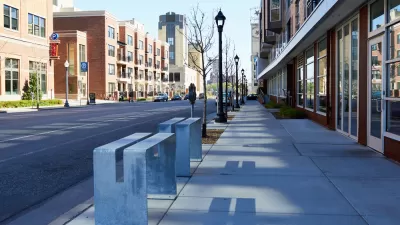The Minneapolis 2040 Comprehensive Plan has attracted so much attention for its changes to single-family zoning, the inclusionary zoning recommended by the plan has flown under the radar.

"Under the Minneapolis 2040 plan, developers will have to set aside specific numbers of affordable or deeply affordable units to create mixed-income communities," reports Marissa Evans.
Supporters of inclusionary zoning, as the policy is known, argue that the requirements will ensure new affordable housing supply. "But building developers say the mandate could be costly for them and even cause them to forgo building in Minneapolis altogether," according to Evans.
While the City Council gave final approval for the Minneapolis 2040 Comprehensive Plan in November, parts of the plan will require a more piecemeal approach to approval, including inclusionary zoning. "The council is slated to vote next month on whether to require developers to set aside 8% of rental units for households earning up to 60% of the area median income. Developers could also set aside 4% of affordable rental units for households earning up to 30% of the area median income," reports Evans.
FULL STORY: Minneapolis eyes permanent policy for mixed-income communities

Maui's Vacation Rental Debate Turns Ugly
Verbal attacks, misinformation campaigns and fistfights plague a high-stakes debate to convert thousands of vacation rentals into long-term housing.

Planetizen Federal Action Tracker
A weekly monitor of how Trump’s orders and actions are impacting planners and planning in America.

In Urban Planning, AI Prompting Could be the New Design Thinking
Creativity has long been key to great urban design. What if we see AI as our new creative partner?

Car Designs Make it Harder to See Pedestrians
Blind spots created by thicker pillars built to withstand rollover crashes are creating dangerous conditions for people outside vehicles.

Cal Fire Chatbot Fails to Answer Basic Questions
An AI chatbot designed to provide information about wildfires can’t answer questions about evacuation orders, among other problems.

What Happens if Trump Kills Section 8?
The Trump admin aims to slash federal rental aid by nearly half and shift distribution to states. Experts warn this could spike homelessness and destabilize communities nationwide.
Urban Design for Planners 1: Software Tools
This six-course series explores essential urban design concepts using open source software and equips planners with the tools they need to participate fully in the urban design process.
Planning for Universal Design
Learn the tools for implementing Universal Design in planning regulations.
Appalachian Highlands Housing Partners
Gallatin County Department of Planning & Community Development
Heyer Gruel & Associates PA
Mpact (founded as Rail~Volution)
City of Camden Redevelopment Agency
City of Astoria
City of Portland
City of Laramie




























